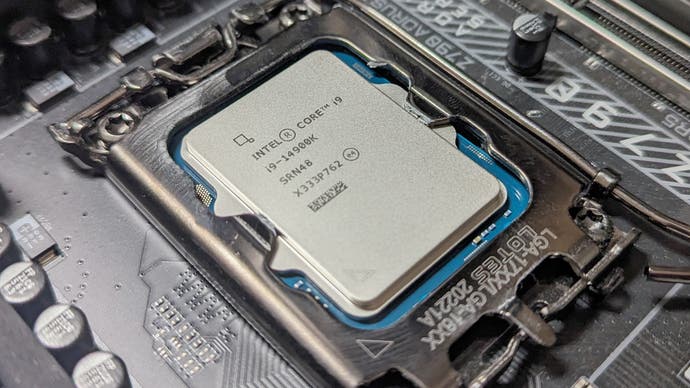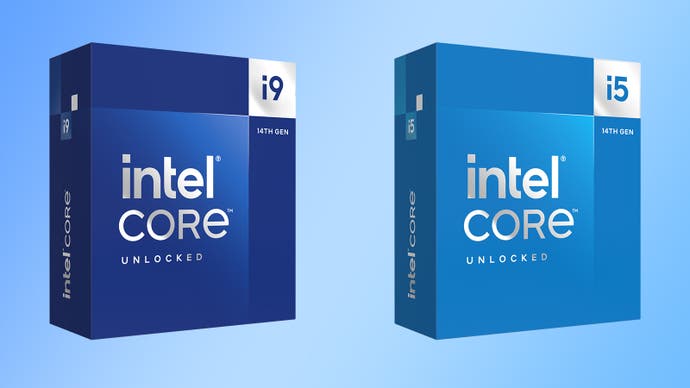Intel Core i9 14900K and Core i5 14600K review: the definition of iterative
Too much tick, very little tock.
Intel's "Raptor Lake Refresh" 14th-gen CPUs are here, reprising the designs and prices we saw on 13th-gen models, but bumping up clock speeds - up to 6GHz for the flagship 14900K. These minor changes come thanks to manufacturing improvements and more generous binning, but are they enough to break the deadlock and give Intel the fastest gaming CPU title once more? We've received the 14900K and 14600K to find out, as we put Intel's latest against our usual barrage of game benchmarks and content creation workloads.
It'll be a tough challenge even with (modestly) higher clocks, as AMD's Ryzen 7000 CPUs are capable from the top to the bottom of the stack while often drawing less power too. This is particularly true of the current fastest gaming CPU by our measurements, the Ryzen 7 7800X3D. This high-end CPU punches well above its weight in gaming and often eclipses the 13900K, thanks to its 3D V-Cache - which boosts gaming performance substantially in many titles.
You can see how the 14900K and 14600K fit into Intel's Socket 1700 lineup in the table below. As a reminder, each of these CPUs benefits from a range of advances over their 11th-gen counterparts, with asymmetric designs which combine performance and effiency cores built on a 10nm "Intel 7" process node. There's also a choice of DDR5 or DDR4 RAM and PCIe 5.0 support, courtesy of a wide range of Z690 and Z790 motherboards.

| Processor | Cores (P/E) | Threads | P Max Turbo | E Max Turbo | Smart Cache | Cost |
|---|---|---|---|---|---|---|
| i9-14900K | 24 (8P/16E) | 32 | 6.0GHz | 4.4GHz | 36MB | $589 |
| i7-14700K | 20 (8P/12E) | 28 | 5.6GHz | 4.3GHz | 33MB | $409 |
| i5-14600K | 14 (6P/8E) | 20 | 5.3GHz | 4.0GHz | 24MB | $319 |
| i9-13900K | 24 (8P/16E) | 32 | 5.8GHz | 4.3GHz | 36MB | $589 |
| i7-13700K | 16 (8P/8E) | 24 | 5.4GHz | 4.2GHz | 30MB | $409 |
| i5-13600K | 14 (6P/8E) | 20 | 5.1GHz | 3.9GHz | 24MB | $319 |
| i9-12900K | 16 (8P/8E) | 24 | 5.2GHz | 3.9GHz | 30MB | $589 |
| i7-12700K | 12 (8P/4E) | 20 | 5.0GHz | 3.8GHz | 25MB | $409 |
| i5-12600K | 10 (6P/4E) | 16 | 4.9GHz | 3.6GHz | 20MB | $289 |
The most interesting spec comparison is between the Core i7 14700K and 13700K, with Intel adding four extra efficiency cores to the 14th-gen i7 to narrow the already-small gap between i7 and i9. Unfortunately, we don't have the 14700K on hand to test, with Intel continuing to offer their Core i5 and Core i9 CPUs as their go-to review units, so we'll have to look at that one on a later date. Otherwise, it's small turbo speed boosts across the board, at the same prices and power targets.
For our testing, we're using the same basic setup as our Ryzen 7800X3D review. That means G.Skill Trident Z5 Neo DDR5-6000 CL30 RAM and Asus' RTX 3090 Strix OC. Cooling is provided by an Asus Ryujin 2 360mm AiO. Our motherboard is the Gigabyte Aorus Z790 Master, with AMD Ryzen 7000 CPUs tested on the equally-impressive ASRock X670E Taichi.
For storage, we're using a 4TB Lexar NM790 PCIe 4.0 NVMe SSD - benchmarking has certainly been improved by the recent drop in NVMe SSD prices. Our rig is completed with a 1000W Corsair RM1000x power supply. Testing was performed with the latest Windows updates (22H2) and BIOS revisions (F11) installed.
Before we get into the gaming benchmarks that make up pages two to four, let's quickly run through some quick content creation benchmarks: a Cinebench R20 3D render and a Handbrake video transcode. These results are useful even in a gaming context as they set expectations for both single-core and multi-core performance in various scenarios.
Cinebench's R20 single-thread benchmark shows a small boost for the 14900K and 14600K, with the former coming within a few points of a mighty 900 score - well in excess of any of the Ryzen 7000 CPUs we've tested, which are all sub-800. The multi-core results are closer, with the 14900K (15962) outpacing the 7950X (14837) and the 14600K (9349) gapping the 7700X (7894).
It's a promising start, though it isn't reflected in the longer Handbrake test. Here, we see results that are basically equivalent to the prior-gen alternatives, with all results within the margin of error - in fact, the 14900K and 13900K turn in exactly equal scores of 41.20fps for the H.265 encode - though the 14900K does draw slightly less power, with system consumption at the wall measured at a peak of 433W versus 473W for the 13900K.
| CB R20 1T | CB R20 MT | HB h.264 | HB HEVC | HEVC Power Use | |
|---|---|---|---|---|---|
| Core i9 14900K | 896 | 15962 | 103.12fps | 41.20fps | 433W |
| Core i5 14600K | 800 | 9349 | 62.68fps | 27.29fps | 288W |
| Core i9 13900K | 873 | 15570 | 104.67fps | 41.20fps | 473W |
| Core i5 13600K | 767 | 9267 | 62.37fps | 26.44fps | 254W |
| Core i9 12900K | 760 | 10416 | 70.82fps | 29.26fps | 373W |
| Core i7 12700K | 729 | 8683 | 57.64fps | 25.67fps | 318W |
| Core i5 12600K | 716 | 6598 | 44.27fps | 19.99fps | 223W |
| Core i5 12400F | 652 | 4736 | 31.77fps | 14.70fps | 190W |
| Core i9 11900K | 588 | 5902 | 41.01fps | 18.46fps | 321W |
| Core i5 11600K | 541 | 4086 | 29.00fps | 13.12fps | 250W |
| Ryzen 9 7950X3D | 788 | 13807 | 95.73fps | 40.70fps | 232W |
| Ryzen 9 7950X | 798 | 14837 | 105.15fps | 45.10fps | 368W |
| Ryzen 9 7900X | 791 | 11324 | 79.38fps | 33.77fps | 288W |
| Ryzen 7 7800X3D | 706 | 7108 | 52.99fps | 23.14fps | 190W |
| Ryzen 7 7700X | 768 | 7894 | 56.69fps | 25.95fps | 266W |
| Ryzen 5 7600X | 750 | 6063 | 44.35fps | 20.28fps | 236W |
| Ryzen 5 7600 | 706 | 5632 | 41.09fps | 18.72fps | 196W |
| Ryzen 9 5950X | 637 | 10165 | 70.28fps | 30.14fps | 237W |
| Ryzen 7 5800X3D | 546 | 5746 | 42.71fps | 19.10fps | 221W |
| Ryzen 7 5800X | 596 | 6118 | 44.18fps | 19.50fps | 229W |
| Ryzen 5 5600X | 601 | 4502 | 31.75fps | 14.43fps | 160W |
Perhaps unsurprisingly, boosting with all 32 cores produces a lot of heat even for a 360mm AiO to deal with, with the 14900K maxing out at 96C on the package (albeit lower for individual cores). That cooling difference perhaps contributes to the Ryzen 9 7950X retaining the overall Handbrake performance lead, with a 45.10fps HEVC average at 368W max.
Now, let's get into the meat and potatoes of our testing - a range of games and scenes that test your CPU in different ways. Pick out your favourite titles from the links below or just hit the next page button to continue.
Intel Core i9 14900K and Core i5 14600K analysis
- Introduction, test rig and content creation benchmarks [this page]
- Gaming benchmarks: Flight Simulator 2020, Hitman 3, Ashes of the Singularity
- Gaming benchmarks: Counter-Strike: GO, Metro Exodus EE, Black Ops Cold War
- Gaming benchmarks: Cyberpunk 2077, Far Cry 6, Crysis 3 Remastered
- Intel Core i9 14900K and Core i5 14600K: the Digital Foundry verdict

